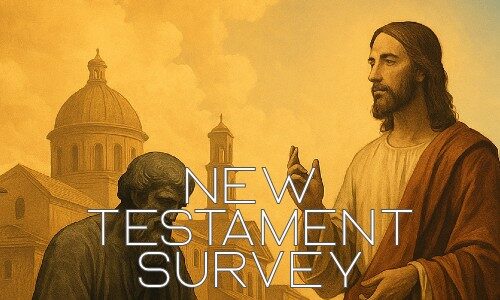This course provides a broad introduction to the books of the New Testament, examining their authorship, historical context, literary features, and theological themes. It often includes an overview of the life of Jesus, the early church, and the letters of the apostles.
New Testament Survey
Level: Master’s
Course Length: 10 weeks (approx. 120–150 hours total if following full module path)
Delivery Mode: Competency-based, self-paced with required final exam
Course Overview
This course offers a comprehensive introduction to the New Testament. Students will explore the authorship, historical background, literary features, and theological themes of the Gospels, Acts, Epistles, and Revelation. Attention will be given to the life and ministry of Jesus, the mission of the early church, and the theological witness of the apostles.
The course is competency-based:
-
Students may complete all modules and lesson plans to prepare for the final exam, or
-
If students already have sufficient knowledge, they may skip directly to the final competency exam.
Competency is demonstrated through the final exam, which evaluates mastery of NT content, context, and themes.
Learning Outcomes
By the end of this course, students will be able to:
-
Outline the structure and divisions of the New Testament.
-
Identify key historical and cultural contexts of the first-century Greco-Roman world and Judaism.
-
Summarize the content, themes, and authorship of each NT book.
-
Analyze theological motifs such as kingdom of God, Christology, salvation, and eschatology.
-
Demonstrate interpretive competence through the study of representative NT passages.
Weekly Breakdown (10 Weeks)
Week 1: Introduction to the New Testament (8–10 hours)
-
Canon formation and textual transmission.
-
Historical setting: Judaism, Hellenism, Roman rule.
-
Competency: Explain NT canonization and first-century background.
Week 2: The Synoptic Gospels (Matthew, Mark, Luke) (12–14 hours)
-
Synoptic problem and literary relationships.
-
Portraits of Jesus: Messiah, Servant, Son of Man, Savior.
-
Key themes: kingdom of God, discipleship, parables, miracles.
-
Competency: Compare theological emphases of the Synoptics.
Week 3: The Gospel of John (10–12 hours)
-
Authorship and distinctiveness.
-
Major themes: eternal life, “I Am” sayings, signs, and belief.
-
Competency: Identify Johannine theology and contrast it with the Synoptics.
Week 4: The Book of Acts (10–12 hours)
-
Authorship, structure, and themes.
-
Expansion of the church from Jerusalem to Rome.
-
Role of the Holy Spirit and missionary journeys.
-
Competency: Trace the growth of the early church.
Week 5: Pauline Epistles (Part 1: Romans, 1–2 Corinthians, Galatians) (12–14 hours)
-
Paul’s life and ministry.
-
Justification by faith, Christian liberty, unity in Christ.
-
Competency: Summarize theology of early Pauline letters.
Week 6: Pauline Epistles (Part 2: Ephesians–Philemon) (12–14 hours)
-
Prison and pastoral letters.
-
Ecclesiology, ethics, and Christian ministry.
-
Competency: Explain Pauline theology of church and Christian living.
Week 7: General Epistles (Hebrews, James, 1–2 Peter, 1–3 John, Jude) (12–14 hours)
-
Themes of faith, works, perseverance, love, and truth.
-
Competency: Distinguish theological emphases across the General Epistles.
Week 8: The Book of Revelation (10–12 hours)
-
Authorship, date, and apocalyptic genre.
-
Key themes: judgment, perseverance, hope, new creation.
-
Competency: Interpret Revelation responsibly within its literary and historical context.
Week 9: Theological Themes of the New Testament (10–12 hours)
-
Christology, kingdom of God, salvation, church, eschatology.
-
Relationship between Old and New Testaments.
-
Competency: Integrate major NT theological themes.
Week 10: Integration & Competency Exam Prep (10–12 hours)
-
Review of key books, authors, and themes.
-
Case studies on NT passages.
-
Practice exam and integrative assignments.
-
Final Competency Exam (required).
Assessment
-
Competency Exam (100%): Required for course completion. Students demonstrate mastery by outlining NT content, interpreting key passages, and explaining theological themes.
-
Optional formative assessments: quizzes, guided readings, and reflection papers (not required).
Curriculum
- 10 Sections
- 22 Lessons
- Lifetime
- Week 1: Introduction to the New Testament (8–10 hours)Canon formation and textual transmission. Historical setting: Judaism, Hellenism, Roman rule.4
- Week 2: The Synoptic Gospels (Matthew, Mark, Luke) (12–14 hours)Synoptic problem and literary relationships. Portraits of Jesus: Messiah, Servant, Son of Man, Savior. Key themes: kingdom of God, discipleship, parables, miracles.4
- Week 3: The Gospel of John (10–12 hours)Authorship and distinctiveness. Major themes: eternal life, “I Am” sayings, signs, and belief.3
- Week 4: The Book of Acts (10–12 hours)Authorship, structure, and themes. Expansion of the church from Jerusalem to Rome. Role of the Holy Spirit and missionary journeys.5
- Week 5: Pauline Epistles (Part 1: Romans, 1–2 Corinthians, Galatians) (12–14 hours)Paul’s life and ministry. Justification by faith, Christian liberty, unity in Christ.3
- Week 6: Pauline Epistles (Part 2: Ephesians–Philemon) (12–14 hours)Prison and pastoral letters. Ecclesiology, ethics, and Christian ministry.3
- Week 7: General Epistles (Hebrews, James, 1–2 Peter, 1–3 John, Jude) (12–14 hours)Themes of faith, works, perseverance, love, and truth.2
- Week 8: The Book of Revelation (10–12 hours)Authorship, date, and apocalyptic genre. Key themes: judgment, perseverance, hope, new creation.3
- Week 9: Theological Themes of the New Testament (10–12 hours)Christology, kingdom of God, salvation, church, eschatology. Relationship between Old and New Testaments.3
- Week 10: Integration & Competency Exam Prep (10–12 hours)4
Instructor

